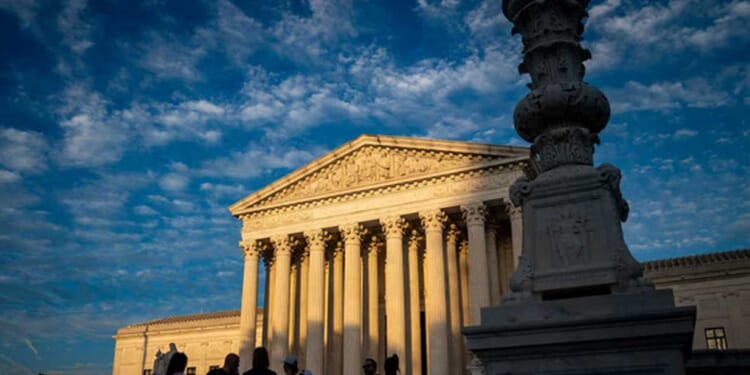
[Order Michael Finch’s new book, A Time to Stand: HERE. Prof. Jason Hill calls it “an aesthetic and political tour de force.”]
The Supreme Court heard oral argument on October 7th regarding a First Amendment challenge to Colorado’s statutory ban on what LGBTQIA+ activists and supporters refer to as “conversion therapy.” This law prohibits licensed therapists from engaging in treatments, including talk therapy, aimed at changing a minor’s “behaviors or gender expressions or to eliminate or reduce sexual or romantic attraction or feelings toward individuals of the same sex.”
Based on the Supreme Court justices’ questions and comments, they appear to be split along the usual ideological lines. The conservative justices who spoke during the oral argument expressed skepticism that Colorado’s law could withstand First Amendment scrutiny, while the three liberal justices discounted any substantial First Amendment problem with the law.
The licensed therapist who challenged the law, Kaley Chiles, is a devout Christian who denied that she was trying to pressure minors to convert their sexual orientation or gender identity against their will. Her attorney explained to the justices that Ms. Chiles talks with minors who are already “seeking to reduce or eliminate unwanted sexual attractions, change sexual behaviors, or grow in the experience of harmony with one’s physical body.” Despite Ms. Chiles’ efforts to help children and their parents who want it, she “is being silenced, and the kids and families who want her help are unable to access it,” Ms. Chiles’ attorney said.
Colorado’s solicitor general argued that the law regulates professional conduct, not speech. He claimed that the harm which the law is intended to address comes “from telling someone there is something innate about yourself you can change — and then you spend all kinds of time and effort trying to do that, and you fail.”
The state’s justification relies on the medical profession’s so-called “consensus” that such form of talk therapy is bogus and detrimental to minors. Colorado’s solicitor general argued that Ms. Chiles’ talk therapy should be regarded as medical professional conduct that violates this widely accepted consensus against so-called “conversion therapy,” which is subject to state regulation.
We know from the days of the Covid 19 epidemic how faulty “medical consensus” can sometimes be. Widely held assumptions among medical professionals, for example, that healthy little children should wear masks in school and that the Covid vaccine would prevent the transmission of the coronavirus turned out to be wrong. Contrarian opinions at the time were unfairly characterized as “disinformation” and inexcusably removed from social media platforms.
Justices Neil Gorsuch and Amy Coney Barrett asked Colorado’s solicitor general repeatedly whether another state could legally take the opposite position from the state of Colorado and prohibit talk therapy that would affirm gender identity changes. The solicitor general tried to make a distinction based on the assumption that the prevailing standard of medical care favored the state of Colorado’s position against what he characterized as “conversion therapy.” He said that “if Petitioner could put on an expert to show conversion therapy is inside the standard of care, then I think we wouldn’t be here.”
The problem with the solicitor general’s line of reasoning is that there is competing scientific evidence as to how best to treat a minor’s gender identity issues.
In fact, recent studies are pointing to the significant physical and psychological risks that hormonal and surgical “gender affirming” transitional treatments entail. In short, the so-called prevailing standard of medical care that Colorado’s solicitor general kept trumpeting during his oral argument is in flux.
It is still highly debated on moral, religious, and scientific grounds whether identifying with a gender that is opposite to one’s biological sex assigned at birth is innate or a social construct. Ms. Chiles believes that gender identity is a social, psychological phenomenon. Based on this viewpoint of hers, she uses talk therapy to help her young clients deal with their gender dysphoria. The talk therapy that Ms. Chiles offers does not involve drug prescriptions, aversion electric shock therapy, or surgery. Colorado’s government should be more concerned with hormonal and surgical therapies used to convert biological boys to transgender girls and biological girls to transgender boys. They certainly interfere more with minors’ normal biological functions and development than Ms. Chiles’ talk therapy does.
Exploring through dialogue a minor client’s unease regarding the gender identity feelings that the child is experiencing constitutes speech, which the First Amendment protects irrespective of what viewpoint the talk therapy reflects. The First Amendment does not permit federal, state, or local governments to choose which viewpoints to permit and which viewpoints to prohibit.
Ms. Chiles’ type of talk therapy as a licensed professional practitioner does not transform her words expressing her viewpoint on gender dysphoria, which is constitutionally protected speech, into misconduct that the state may legitimately ban. If a disgruntled patient or the patient’s parents complain of harm caused by Ms. Chiles’ talk therapy, they can file a malpractice complaint to seek to recover any resulting provable damages.
The Trump Justice Department’s principal deputy solicitor general, arguing as amicus curiae supporting Ms. Chiles, noted the important “difference between letting someone speak and then adjudicating individually that speech after the fact rather than categorically banning it ex ante.” Banning speech ex ante (before the event) is a prior restraint on free speech, which the Supreme Court has called in the past “the most serious and the least tolerable infringement on First Amendment rights.”
Moreover, as Justice Samuel A. Alito Jr. remarked, banning the type of voluntary talk therapy that Ms. Chiles offers “looks like blatant viewpoint discrimination” by government officials. Under the Supreme Court’s strict standard of review of governmental bans of particular content-based speech, Colorado must show that its ban is “narrowly tailored” to further a “compelling government interest” and constitutes the “least restrictive means” to do so.
Suppressing a viewpoint that the government disfavors, like the one that Ms. Chiles expresses in her talk therapy, does not serve any compelling government interest. Rather, as the Supreme Court put it in a previous opinion, it “raises the specter that the Government may effectively drive certain ideas or viewpoints from the marketplace.”
Justice Ketanji Brown Jackson provided a fallacious comparison that rivals her response to a question during her confirmation hearing asking her to define a woman. “No, I can’t,” she said then.
Flash forward to the oral argument in the Chiles case. Justice Jackson tried to equate a state law “to prohibit certain medical treatment, gender-affirming care, being given to minors in the form of medication,” upheld by the Supreme Court, with Colorado’s statutory ban. “Here, we have a state that wants to prohibit gender-related medical treatment in the form of talk therapy, but we now have the First Amendment that is inhibiting the state’s ability to do that,” she said. “And I’m just, from a very, very broad perspective, concerned about making sure that we have equivalence with respect to these things.”
The difference should be obvious. Talk therapy is speech, pure and simple. Categorically banning what Ms. Chiles says to her patients during her talk therapy violates her First Amendment rights. A ban on prescribing, administering, or dispensing puberty blockers or hormonal drugs to a minor as part of gender transition therapy prohibits conduct – not speech – that could have adverse lifelong consequences for the child. There is no functional equivalence, as Justice Jackson claims.
In another Colorado case, the Supreme Court in 2023 upheld a website designer’s free speech right over the state’s claim that the website designer had violated its anti-discrimination law by refusing to create a wedding website for same-sex couples. The Court ruled that the state of Colorado cannot infringe on the designer’s First Amendment rights by compelling her to create work with an expressive message that violates her strongly held beliefs.
Now the Supreme Court is deciding whether the First Amendment overrides the state of Colorado’s progressive policy to ban talk therapy content discussing alternatives to “gender-affirming” medical treatments for minors that would affirm their bodies’ biological sex instead. The odds favor another victory for free speech.

















